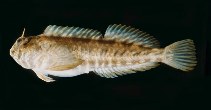| Family: |
Blenniidae (Combtooth blennies), subfamily: Salariinae |
| Max. size: |
11 cm SL (male/unsexed) |
| Environment: |
demersal; marine; depth range 0 - 3 m |
| Distribution: |
Indo-Pacific. |
| Diagnosis: |
Dorsal spines (total): 13-13; Dorsal soft rays (total): 14-16; Anal spines: 2-2; Anal soft rays: 15-17. Dusky bands on body and upper lip; pale area behind eye followed by an irregular dark mark (Ref. 4404). |
| Biology: |
Adults inhabit reef flats exposed to waves and intertidal shores (Ref. 90102). Oviparous. Eggs are demersal and adhesive (Ref. 205), and are attached to the substrate via a filamentous, adhesive pad or pedestal (Ref. 94114). Larvae are planktonic, often found in shallow, coastal waters (Ref. 94114). |
| IUCN Red List Status: |
Least Concern (LC); Date assessed: 25 March 2009 Ref. (130435)
|
| Threat to humans: |
harmless |
Source and more info: www.fishbase.org. For personal, classroom, and other internal use only. Not for publication.

